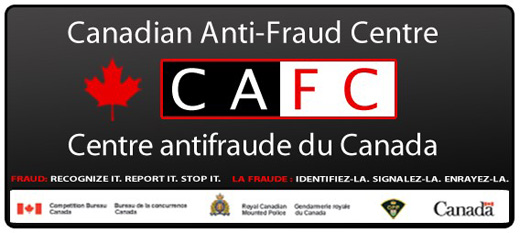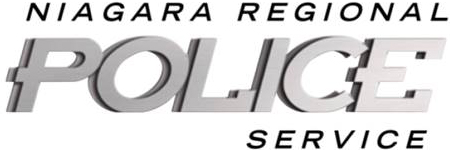
Fraud is one of the fastest growing crimes and can have a devastating impact on its victims. Being knowledgeable about how frauds are committed will go a long way in protecting you from becoming a victim.
- Protect your personal information - never give your personal information unless you know with whom you are dealing and how that information will be used. Never reply to unsolicited emails or phone calls seeking personal details, banking information, or credit card information. Minimize personal information contained on social media sites and limit access to who can view your information.
- Monitor your bank and credit card activity and report any discrepancies immediately to your financial institution or credit card issuer.
- Review your credit history through Equifax and Trans Union Credit. Dispute any unauthorized entries with the credit bureau and file a police report if you are the victim of identity theft.
- Internet scams are numerous and often cross international borders. Use caution when dealing with persons you do not know especially if asked to cash a cheque and wire or e-transfer funds to another person. Even certified cheques can be forged. Use complex passwords on your computers and electronic devices. Utilize and maintain current antivirus software. Be cautious of links contained in emails. Never give anyone access to your computer based on an unsolicited phone call or email.
- There is a lot of truth to the old adage 'if it sounds to go to be true, it is probably a scam'
- Take the time to seek out advice or do research before committing or sending funds. Don't let anyone rush you into making a decision.
- Consider adding your phone number to the National Do Not Call List www.lnnte-dncl.gc.ca/index-eng .
-
Consider sharing this information with everyone you know to get the message out.
- Talk to friends, family, the elderly, neighbours, and members of the vulnerable sectors of the community who may not be connected to social media or may have missed previous warnings in the news.
Scams can occur over the phone, by text message, email, and door- to-door
Common Known Scams
| SexTortion Scam |
|
Scammers send a message out to someone that may sound similar to:
The extortion scammers demand is often between $600 to $4500, to be paid to a Bitcoin account included in the email message. The "old" password that is often included is just that, old. Cybercriminals sometimes obtain old passwords by data breachs. |
| The "Grandparent Scam" |
| The scammers target the elderly in an attempt to steal large sums of money through a wire transfer. Financial losses from this scam are usually several thousand dollars per victim. A grandparent will receive a phone call from someone who claims to be their grandchild or someone acting on their behalf such as a police officer, lawyer, doctor, or other person. Make attempts to contact your grandchild or another family member first to determine whether the call is legitimate. |
| Canada Revenue Agency Scam |
|
Scammers posing as Canada Revenue Agency workers are still targeting people in the Niagara Region. The scam may insist that personal information is needed so that the taxpayer can receive a refund or a benefit payment. Cases of fraudulent communication could also involve threatening or coercive language to scare individuals into paying fictitious debt to the CRA. The scammers will often threaten arrest. This debt repayment may involve gift cards and wire transfers. A government agency will never use gift cards as a form of debt re-payment. If you receive a call saying you owe money to the CRA, you can call or check "My Account" on line at http://www.cra-arc.gc.ca/scrty/frdprvntn/menu-eng.html |
| Door-to-Door Sales Fraud |
| Watch for door-to-door sales people who pressure you to enter your home to inspect items such as your monthly bill, hot water tank, furnace, and air conditioning. No one has the right to enter your property without prior notice. The situation of a person or persons attending your door unsolicited is yours to control. Never sign on the first day until you've had a chance to sleep on it. Don't be fooled by time sensitive deals or discounts. |
| Puppy Scam |
| With so many people isolating and experiencing loneliness they are seeking companionship. One of the scams on the rise is websites and online listings have popped up selling puppies. Many scammers are asking for money up front to "Hold" a puppy which is usually sent out of the Province by Wire transfer or Bitcoin. Before sending any money do your homework and make sure you're dealing with a reputable breeder. Search the email address, telephone number or any other information to see if there are fraud complaints or positive review for the seller. |
| Online Buyers |
| The use of online e-commerce sites has skyrocketed to make durable good purchases. If you're dealing with an unknown person or website to make an online sale be cautions if the seller request money be sent via bitcoin, wire transfer or electronic fund transfer (EFT). Most reputable sellers will use an online payment processor to conduct their transactions. Consider using a third party payment providers who protect your purchase. If it seems too good to be true it probably is. |
| Online Sellers |
| People selling items are at risk too. Sometime a buyer of an item will over pay by a fraudulent cheque or transfer and request funds be sent back to them or have them forward the over-payment to a fraudulent shipping company. By the time the fraudulent payment is discovered the funds are already collected. If you have any doubts about a payment attempt to confirm the payments with the bank and wait for the payment to clear |
| CEO Scam |
| Fraudsters will impersonate a senior company executive, either by gaining access to their email address or by imitating one. They will send realistic-looking emails that try to trick you into wiring money or gift cards to a third party. The emails will make the request sound urgent and confidential. For example, they may say the money is needed to secure an important deal. If you get an unusual request for money transfers or gift cards always check the senders email address and confirm with a telephone call. |
| Phishing Emails |
| Phishing is when you get an unsolicited email that claims to be from a legitimate organization, such as financial institutions, businesses or government agencies. Scammers ask you to provide or verify, either via email or by clicking on a web link, personal or financial information, like your credit card number, passwords and social insurance number. Smishing is the same thing, except it occurs via text messages. |
| Romance Scam |
|
Scammers are notorious for creating fictitious profiles on dating sites or contact their targets through popular social media sites like Instagram, Facebook, or Google Hangouts. The scammers strike up a relationship with their targets to build their trust, sometimes talking or chatting several times a day. They then make up a story and ask for money. They’ll often say they’re living or traveling outside of the United States. We’ve heard about scammers who say they are: working on an oil rig, in the military, a doctor with an international organization. They will ask for money to pay for a plane ticket or other travel expenses, pay for surgery or other medical expenses, pay customs fees to retrieve something, pay off gambling debts, or pay for a visa or other official travel documents. Trust those people who you know NOT those who appeal to your emotions with false words. |
| Utility / Business Spoofing Scam |
|
Fraud Scammers will impersonate legitimate and trusted sources. Spoofing is a scam related to emails, text messages, phone calls and websites. Scammers use spoofing to access a person's personal information and to sometimes spread malware and spyware. In essence these attacks can lead to data breaches and financial loss to the victim. They can also result in a loss of revenue to those individuals and commercial entities that have been deemed as secondary victims/targets when they are impersonated. It can affect a business' reputation in the community. You should be on the lookout for poor spelling, inconsistent grammar and unusual sentence structure. Don't click on unfamiliar links or attachments. Don't take phone calls you don't recognize even if the phone number looks legitimate. Call the utility / business yourself to learn if what your observing is legitimate. Be wary when the spoofer scammer indicates / threatens you will lose a service if you don't pay immediately by cryptocurrency, money transfer or credit card. The NRPS has received spoofing scam complaints involving local utilities (eg. Niagara Peninsula Energy), financial institutions, online media streaming services and third party payment mediums. These service providers do not normally contact customers by electronic messaging or phone. If you receive a something suspicious, stop, don't panic and conduct your own investigation. |
| Vehicle Sales On-Line Scam |
| Scammers are posing as legitimate purchasers of used vehicle sales. They contact you as a result of you placing your used vehicle for sale on a web based marketplace site. The scammers are savvy enough not to contact you via the on-line goods and services marketplace website, rather move to calling or texting your cellphone. They then propose meeting at a venue that has quick access to the roadway. They arrive ahead of you usually driven to the location by an accomplice who subsequently disappears. Upon your arrival the scammer convinces you it is safer for them to test drive the vehicle due to the pandemic. The seller agrees, the vehicle is driven away never to be seen again. |
| Covid-19 Scams |
| The Canadian Anti-Fraud Center has released information on several new Covid-19 Scams being seen across Canada.
Spoofed government, healthcare or research information unsolicited calls, emails and texts requesting urgent action or payment and/or offering medical advice, financial relief, or government assistance and compensation
Unauthorized or fraudulent charities requesting money for victims, products or research
High-priced or low-quality products purchased in bulk by consumers and resold for profit
Fake and deceptive online ads, including:
|
| Contractor Scams |
|
The Niagara Regional Police Service provides the following information to consumers to assist them when considering hiring a contractor for their home. Consumer Protection Tips When Hiring a Home Contractor:
Put it on Paper:
|
Have you been the victim of fraud?
How to report a scams
If you have been a victim of a scam and experienced a financial loss, please call the Niagara Regional Police Service non-emergency number at 905-688-4111.
If you received one of these calls but did not experience a financial loss, call Phonebusters at 1-888-495-8501 or contact the Canadian Anti-Fraud Centre at 1-888-495-8501 http://www.antifraudcentre-centreantifraude.ca/index-eng.htm
Fraud Victim Checklist
| Fraud Victim Checklist |
|
If you are a victim of fraud, please review the below checklist of next steps or Download it Here.
1) Document all steps taken and make detailed notes. 2) Keep all records. 3) Complete a credit check with both credit agencies and obtain your credit reports from them. Request a fraud alert be placed on your file.
4) If applicable, report all lost or stolen cheques, and/or debit and credit cards to the issuing financial institution(s). 5) Notify your financial institution(s) to have your debit card, credit card and/or bank account numbers changed if you have given those numbers to the fraudsters. Change your password(s)/personal identification number (PIN) code(s). Request that an alert be placed on your account. 6) If applicable, report any unauthorized account openings (e.g., cell phone contract/purchases) to the appropriate company. 7) If applicable, report to the institution(s) that completed the transfer(s) of money/property associated to the fraud, such as:
8) If the fraud occurred online, report the incident to the applicable website holder, such as:
9) If you suspect your mail has been sent to another address, or your address has been used for other fraudulent purposes, notify Canada Post Customer Service at 1-800-267-1177. 10) Consider changing your phone number, email address and or social media account name if you have had contact with the suspect(s) with any of those communication methods. Monitor any incoming calls utilizing call display services. If your identity documents (passport, permanent resident card, driver’s licence, social insurance number card, health card, birth certificate, etc.,) have been lost or stolen, contact the appropriate section of the provincial or federal government.
Report to the Canadian Anti-Fraud Centre (CAFC) at 1-888-495-8501 or visit the website at www.antifraudcentre.ca |
Want more information on scams?
The following sites provide current information relating to current frauds and additional information to protect you from falling victim to a scam:
For more information, visit The Canadian Anti-Fraud Centre web site 
 I'd Like To
I'd Like To





 Subscribe to this Page
Subscribe to this Page